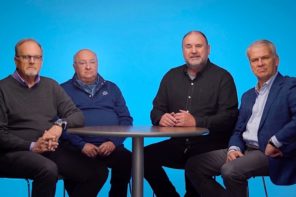You’d never know it from Ben Carson’s exhortations for Americans to arm themselves against perpetrators of gun violence, but a central belief of his religion, Seventh-day Adventism, is in non-violence.
From the founding of the denomination in 1863, both doctrinally and culturally, Adventists have been “non-combative,” and their status in wartime is that of conscientious objector, said Alexander Carpenter, a writer and academic who serves on the board of Adventist Forum, a liberal non-profit that publishes the independent journal Spectrum.
In his statements about guns and gun violence, Carson “is not an authentic Adventist,” added Carpenter, who also has taught at Pacific Union College, one of a dozen Adventist colleges and universities in the United States. Many Adventists have served in the U.S. military, but refused to carry weapons. Others served in the medical corps. Still others, such as the young medical students at the Adventist Loma Linda University medical school, volunteered during World War II to be medical test subjects rather than engaging in combat.
“The language of support for guns is totally outside the rhetoric and beliefs of the Adventist church,” said Carpenter. And Carson’s discredited and offensive statements that the Holocaust occurred because Nazis would not allow Germans to carry guns is “exactly opposed to Adventist teaching,” Carpenter said. In Adventist theology, “your decision not to act [with violence] is where you have power.”
Co-founded in 1863 by Ellen and James White and others, amid the religious fervor of mid-nineteenth century America, Adventism grew out of the “Great Disappointment”—when Jesus did not return as prophesied by William Miller, the Baptist preacher, on October 22, 1844. In the wake of the Great Disappointment, Ellen White began having dreams and visions, which led early Adventists to see the Great Disappointment not with sadness, but as a key historical moment, “the start of Jesus’ final work of atonement,” according to the Adventist Review, writing on the 170th anniversary of the Great Disappointment. According to the official Adventist statement of beliefs, in 1844 Jesus “entered the second and last phase of His atoning ministry,” known to Adventists as “the investigative judgment,” and seen as the preparation for Jesus’s eventual return.
There are approximately one million Adventists in the United States, and 18 million worldwide. Observing the Sabbath on Saturday, not Sunday, and a commitment to health and wellness, including vegetarianism, are prominent features that distinguish Adventism from other Christian denominations. Protecting the Saturday Sabbath observance has driven Adventist involvement in legal challenges under the Free Exercise Clause, such as the one that led to the landmark 1963 Supreme Court decision in Sherbert v. Verner, which protected the constitutional right of a Seventh-day Adventist to refuse to work on Saturday.
The church also supports church-state separation, a stance that drove its May 2015 statement that it would not take a position on a candidate in the presidential race, and urging pastors and church employees to “also exercise extreme care not to express views in their denominational capacity about any candidate for office, including Dr. Carson.”
“Adventism and Mormonism are the two lasting vestiges of unique American religions to come out of the Second Great Awakening,” said Jason Hines, an Adventist writer and lawyer who often covers church-state separation issues. “As newcomers, it’s taken a while for them to be accepted.”
While Mitt Romney faced direct insults from evangelicals and others over his religion when he ran for president in 2012, Carson—with a few exceptions, such as withdrawing from speaking at a Southern Baptist Convention conference after pastors raised both political and theological concerns—seems to have immunized himself from that sort of scrutiny.
Although Carson has downplayed his Adventism during his presidential run, depicting himself more generically as a Christian, his commitment to Adventism is well documented. In his book first published in 1990, Gifted Hands, Carson wrote the “Adventist denomination is the only spiritual home I’ve ever known.”
“I’m an elder at Spencerville Seventh-day Adventist Church,” in Silver Spring, Maryland, Carson wrote. “I’m also Health and Temperance Director, which means I present special programs and coordinate the other medical workers in our church.”
For black Adventists, Gifted Hands was a seminal work and Carson long seen “as a shining light of what a black Adventist can become. There’s not a black Adventist I know who didn’t have Gifted Hands,” said Hines, who currently teaches Christian ethics and law at the Adventist University of Health Sciences in Orlando, Florida.
“I have been steeped in the Carson biography for 30 years,” Hines added.
While Carson and his biography have been “pervasive” for black Adventists, said Hines, white Adventists have discovered him more recently—in politics. While some conservative Adventists may be drawn to him, “black liberals are pulling away,” said Hines.
Carson’s fusion of religion and American-ness—rooted in the Tea Party and religious right rhetoric about the “Christian nation” and disdain for “political correctness”—is drawn from American conservatism, and is in many ways contrary to Adventism. Mother Jones’ David Corn, for example, recently documented Carson’s affection for W. Cleon Skousen, the Cold War-era writer and conspiracy theorist long popular with conservatives and the religious right, and more recently with Tea Party activists. But it is “not common,” said Carpenter, for Adventists to affiliate with the Tea Party.
While central to religious right activism, abortion has not been a “wedge issue” for Adventists, said Carpenter. That issue, along with guns and religious liberty, are “three things that would create wedges between him and his base and make him choose between his faith and his politics,” he added.
In a 2014 review of Carson’s book, One Nation: What We Can All Do to Save America’s Future, Douglas Morgan, a historian at Washington Adventist University, wrote that Carson “advocates an agenda that looks very much like what Adventists have long opposed in the name of religious liberty.” Morgan maintained that Carson advocated “a civil religion that re-defines the God of the Bible as the patron deity of the United States of America,” and displayed “a general tendency to use the Bible primarily for practical wisdom and selective moral discipline that he believes will strengthen America’s power and prosperity as world hegemon.”
But Adventists, Morgan went on:
by contrast have typically emphasized the portrayal of human empires in apocalyptic prophecy, and more broadly the entire sweep of the “story of redemption,” as arrogant oppressors, reiterations of “Babylon” that defy the true and living God and persecute the people of God. The main role of the latter is faithful witness to God’s government and coming kingdom, not to promote the might of worldly empires.
That would appear to be a religious worldview that would alarm some of Carson’s biggest fans.
Hines hopes that Carson isn’t asked on the national stage to explain Adventist eschatology, which portrays the American government as one that will eventually, in league with the Catholic Church, persecute Adventists for their observance of the Saturday Sabbath.
It appears that Carson has allied himself with the Tea Party and religious right despite his Adventism, not because of it. Oddly enough, Adventists long have been skeptical of the religious right, dating back to the days of the Moral Majority and Christian Coalition. Many Adventists, even conservative ones, said Carpenter, were wary of that entanglement of religion and politics, and saw the rise of those political movements in eschatological terms, as a bloc that would eventually work with the American government to oppress the religious freedom of the Saturday-observant Adventists.
Of course within most religions, adherents vary in how literally they interpret the tenets of the faith, and in presidential campaigns, candidates shouldn’t be asked to explain their religion, unless they’ve made it an issue of how they would govern. Ben Carson has decidedly not made his Adventism an issue. In fact, it’s hard to think of another candidate who seems to have run so far from his own faith.




